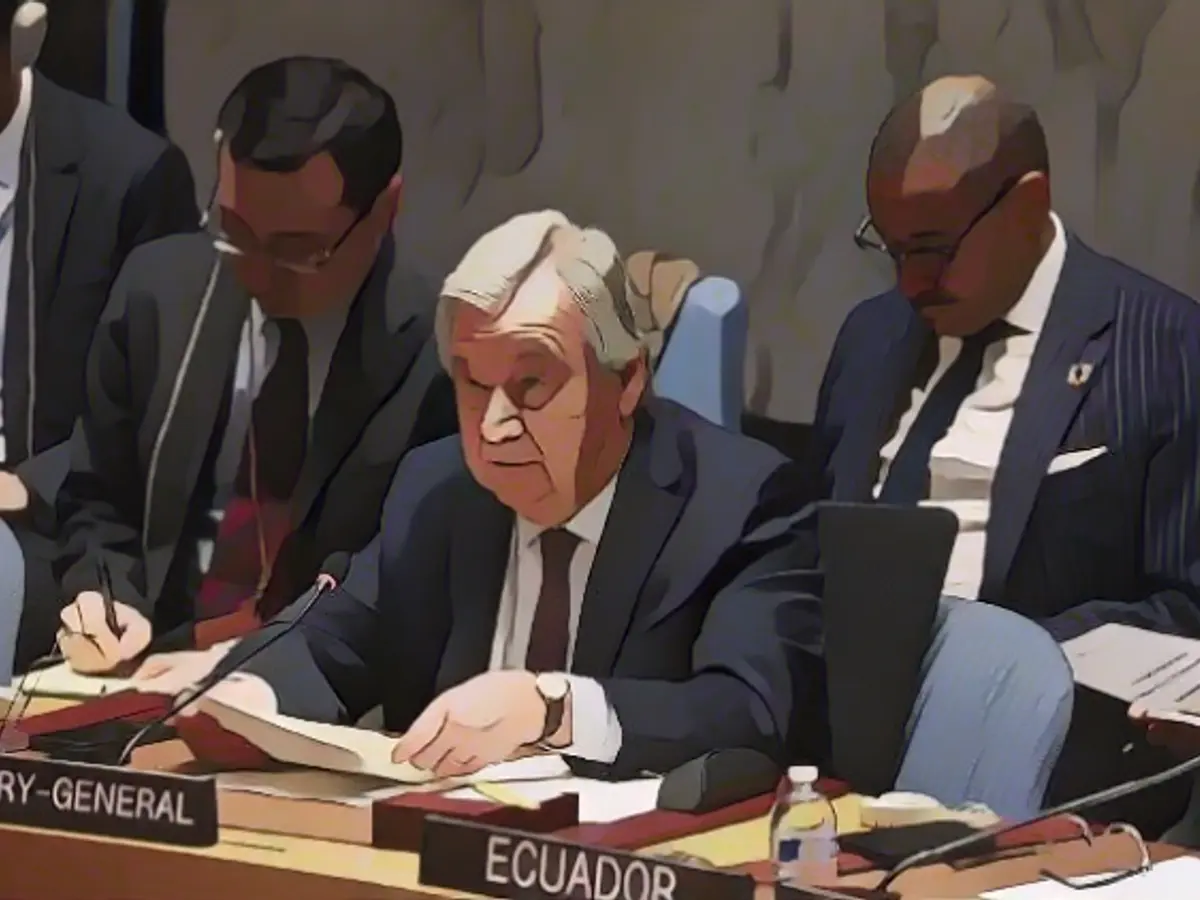Guterres warns against "collective punishment" for Palestinians
The atrocities committed by Hamas in Israel do not justify punishing all Palestinians. UN Secretary-General Guterres made this clear at the emergency meeting of the Security Council. There must be an urgent ceasefire, he demands.
UN Secretary-General António Guterres has warned against punishing all Palestinians for the atrocities committed by the radical Islamic group Hamas. "The brutality committed by Hamas can never justify the collective punishment of the Palestinian people," said Guterres at an emergency meeting of the UN Security Council. At the same time, he called for the "immediate and unconditional release" of the remaining hostages held by Hamas.
Guterres said that the "around 130 hostages" must be treated "humanely" until their release and visited by the International Committee of the Red Cross. He condemned the attacks by Hamas in Israel and expressed his "horror" at reports of sexual violence against women. There was "no justification whatsoever" for the brutal attacks by Hamas.
He urged the UN Security Council to advocate a humanitarian ceasefire. The "limit of resilience" in the Gaza Strip had been reached, said Guterres. "There is a high risk that the humanitarian support system in Gaza will collapse completely, which would have devastating consequences." The United Arab Emirates then submitted a new draft resolution calling for a ceasefire. It was not clear if and when the draft would be voted on. This had actually been planned for the meeting with Guterres, but was then postponed again. It is possible that a vote could still take place this Friday, according to diplomatic circles. Similar resolution proposals had previously failed due to resistance from the USA.
The UN Secretary-General had convened the meeting. In his letter, he referred to Article 99 of the UN Charter. This states that "the Secretary-General may bring to the attention of the Security Council any matter which, in his opinion, could endanger the maintenance of international peace and security". The article had not been used for decades.
Baerbock appeals to Israel
The war is also a topic at the World Climate Conference in Dubai. "We expect Israel to adapt its military actions in order to alleviate civilian suffering," said Federal Foreign Minister Annalena Baerbock. Israel must allow more humanitarian aid and take more targeted action. "Too many civilians in Gaza have already fallen victim to the conflict," she said, taking a similar line to Guterres. The question of how Israel conducts the fight is central. "Because the 'how' of warfare must open up political options for us instead of closing them off." The war will not be won if peace is lost in the process.
The war between Israel and the radical Islamic group Hamas has been going on for two months. On October 7, hundreds of Hamas terrorists invaded Israel and committed atrocities, mainly against civilians. According to Israeli reports, around 1200 people were killed in Israel and around 240 people were taken hostage. According to Israeli information, 138 of those abducted are still being held by Hamas.
According to Hamas figures, which cannot be independently verified, at least 17,487 people have been killed in the Palestinian territory since the start of the war. According to UN figures, 1.9 million Palestinians have been displaced within the Gaza Strip. Many of them have now fled to Rafah on the border with Egypt.
Read also:
- Year of climate records: extreme is the new normal
- Precautionary arrests show Islamist terror threat
- SPD rules out budget resolution before the end of the year
- Numerous oil, gas and coal lobbyists at climate conference
UN Secretary-General António Guterres also urged support for Annalena Baerbock's appeal to Israel. He emphasized the necessity for Israel to modify its military actions to reduce civilian suffering, aligning with Baerbock's stance. Guterres suggested that Israel should allow more humanitarian aid and take more targeted actions to minimize harm.
At the UN Security Council, Guterres and Baerbock both condemned the Hamas group's war actions against Israel, with Guterres expressing his "horror" at reports of sexual violence committed by Hamas against Palestinian women. Despite this, both leaders maintained that the collective punishment of Palestinians was unjustifiable, referring to the plight of around 130 hostages held by Hamas and the potential collapse of the humanitarian support system in Gaza.
Several Arab countries, including the United Arab Emirates, supported Guterres and Baerbock's calls for an immediate and unconditional ceasefire, expressing concern for the vulnerable Palestinian population in the Gaza Strip. Guterres highlighted the "limit of resilience" in Gaza, warning of the devastating consequences if the humanitarian support system failed.
Source: www.ntv.de








